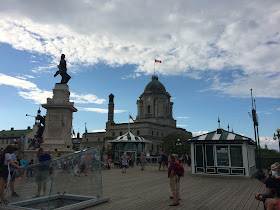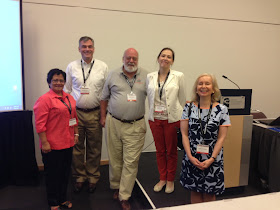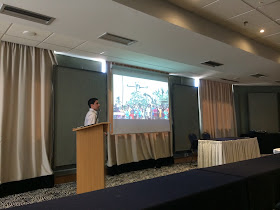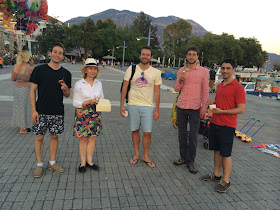Last April, I published an article in The Conversation, "Calculating where America should invest in its transportation and communication networks."
The article was republished in multiple publications and in May I received an email from a very friendly segment producer of the Matt Townsend Show. The message stated that Dr. Townsend had read my article, liked it a lot, and would like to have me as a guest on his radio show. Multiple dates as options were provided, but, given my very busy conference schedule this summer, plus the fact that I am a Summer Fellow at the Radcliffe Institute for Advanced Study (RIAS) at Harvard, we settled on today as the date!
Trying to find a landline was not easy but, thanks to RIAS, a nice quiet and comfortable office was found and I also had a cell phone as a backup. I had listened to several segments of the show and very much enjoyed the facility with which Dr. Townsend asked questions and kept the conversation going on numerous timely topics being addressed by those that he was interviewing.
I came prepared with a bottle of water and my latte from Peet's to keep myself hydrated and pumped, which was easy.
Critical infrastructure networks is a topic I am extremely passionate about and have done research on with wonderful doctoral students from the Isenberg School as well as collaborators from Harvard to many other universities; some of these are Supernetwork Center Associates. Most notably, I mention Dr. Patrick Qiang, with whom I wrote the Fragile Networks book, and which was featured in the interview.
The interview can be accessed online.
Many thanks to Dr. Matt Townsend for the invitation to be on his show and for his terrific questions as an interviewer! I enjoyed the experience a lot.
And, coincidentally, afterwards, I had lunch with Professor David Parkes, a chaired professor of computer science at Harvard. When I was a Science Fellow at RIAS in 2005-2006, he, Professor Patrizia Daniele of the University of Catania, and I co-authored a paper on the Internet and the Braess paradox, which was published.
Of course, in my interview with Dr. Matt Townsend I had to speak on the Braess paradox!
Wednesday, July 26, 2017
Saturday, July 22, 2017
Operations Researchers Rock in Quebec City - What a Terrific IFORS Conference
I am back from the IFORS (International Federation of Operations Research Societies) conference in Quebec City. It was a delight for numerous reasons and attracted over 1,500 participants from 52 countries which speaks to the interest in operations research globally. This conference takes place once every three years and the next one will be in 2020 in Seoul, Korea.
First, the location of the conference was terrific - the convention center in Quebec City - with large hotels in proximity and amazing parks and old town as well.
Although I was born in Canada, and have been back for numerous conferences and speaking engagements, this was my first time in Quebec City. I travel a lot and Quebec City now ranks in my top group of cities in terms of beauty, greenness, walkability and infrastructure, amenities, cultural opportunities, and the friendliness of the people. The attention to preservation of history and buildings is also outstanding.
I also appreciated that several streets at times of day are for pedestrians only.
This conference had 4 fabulous plenary speakers, including the Nobel laureate in Economics, Alvin Roth, and 1 female - Martine Labbe, and 10 keynote speakers (4 females among them, including Asu Ozdaglar, whom I have hosted at the Isenberg School). Special recognition should be given to Egon Balas of Carnegie Mellon University for giving a plenary talk - he is an example for all of us as to how to live and work to the fullest. Professor Balas is in his mid90s and his memoir is a must read.
I enjoyed speaking to Detlof Winterfeldt of USC, who gave a very interesting keynote on a topic that he has worked on for a long time through the DHS Center - CREATE - that of homeland security and decision analysis. I was delighted to see him mention Randy Hall, and to cite the work of Adam Rose, who recently was elected an RSAI Fellow. On the last slide of his keynote cybersecurity was mentioned (a topic we have been doing a lot of research on). Below is a photo taken with the Executive Director of INFORMS, the always energetic and fabulous, Melissa Moore, and Detlof after his keynote.
A special shoutout to Andres Weintraub of Chile, who set a new high bar for plenary talks, and who took us on a journey of operations research and practice, overviewing the amazing work he has done with students and collaborators, on topics ranging from forestry to mining to enhancing lunches for schoolchildren to a big passion of his - the scheduling of soccer games! He shared the following sage advice in terms of projects:
1. Partner with the person in charge
2. Do not trust anybody (do the whole project)
3. Work daily side by side and
4. Show me the money (free work is not appreciated).
In his plenary talk, he noted how George Nemhauser, an operations research superstar and mentor to generations, came to visit him in Chile to entice him to work on sports scheduling and he also noted Mike Trick, the President of IFORS. Mike deserves applause for his service to IFORS and the profession as well as thanks for the success of this conference as do the organizers. Below is a column by Mike in the latest IFORS newsletter.
Given the size of the conference there were many operations researchers that I did not manage to have a chance to speak to but, nevertheless, I enjoyed not only the scientific talks, and we had two to present, with the titles below, but also seeing many friends and even meeting face to face several Twitter tweeps, including Carlos Zetina, who is a dynamo behing the success of the INFORMS Student Chapter in Montreal..
We had photos taken of the presenters and collaborators in our sessions in which there were speakers from Russia, India, the US, Japan, and the Czech Republic and one of the chairs was from the Philippines.
It was special to see my book, Competing on Supply Chain Quality, with Michelle Li (who coincidentally got married in Cambridge while I was at IFORS), on display at the Springer booth. And, always, it is great to see the Springer Editors!
The snacks (this is important) were delicious during the breaks and I very much enjoyed the lunch provided on Thursday - joining us at our table was Destenie Nock, a doctoral student at UMass Amherst and a very active member of award-winning UMass Amherst INFORMS Student Chapter.
It was also terrific to see some of the fabulous INFORMS staff members, including Mary Magrogan and Maris van der Eijk.
Another high point was seeing two of my former Isenberg School of Management PhD students, Tina Wakolbinger who is a Professor at the Vienna University of Economics and Business in beautiful Austria and Fuminori Toyasaki, who is a Professor at York University in Toronto. I had seen them both in Vienna in late June at a conference on Humanitarian Operations that Tina had organized that was very successful and that I had blogged about.
Many thanks to the organizers of this IFORS conference and to all concerned who made it the big success that it was! Thanks also for selecting Quebec City as the conference site - this city is magical. I leave you with photos of some wonderful food, some of which we indulged in, and a photo of a sculpture by Salvador Dali that graced the boardwalk in old town.
And, since I was born in Canada, I also have to wish Canada a Happy 150th Birthday! Indeed, as the rumor has it, Canadians are very polite and nice! When the wind blew my hat off in a rainstorm, two Canadians went running after it in a busy street to retrieve it for me!
First, the location of the conference was terrific - the convention center in Quebec City - with large hotels in proximity and amazing parks and old town as well.
Although I was born in Canada, and have been back for numerous conferences and speaking engagements, this was my first time in Quebec City. I travel a lot and Quebec City now ranks in my top group of cities in terms of beauty, greenness, walkability and infrastructure, amenities, cultural opportunities, and the friendliness of the people. The attention to preservation of history and buildings is also outstanding.
I also appreciated that several streets at times of day are for pedestrians only.
This conference had 4 fabulous plenary speakers, including the Nobel laureate in Economics, Alvin Roth, and 1 female - Martine Labbe, and 10 keynote speakers (4 females among them, including Asu Ozdaglar, whom I have hosted at the Isenberg School). Special recognition should be given to Egon Balas of Carnegie Mellon University for giving a plenary talk - he is an example for all of us as to how to live and work to the fullest. Professor Balas is in his mid90s and his memoir is a must read.
I enjoyed speaking to Detlof Winterfeldt of USC, who gave a very interesting keynote on a topic that he has worked on for a long time through the DHS Center - CREATE - that of homeland security and decision analysis. I was delighted to see him mention Randy Hall, and to cite the work of Adam Rose, who recently was elected an RSAI Fellow. On the last slide of his keynote cybersecurity was mentioned (a topic we have been doing a lot of research on). Below is a photo taken with the Executive Director of INFORMS, the always energetic and fabulous, Melissa Moore, and Detlof after his keynote.
A special shoutout to Andres Weintraub of Chile, who set a new high bar for plenary talks, and who took us on a journey of operations research and practice, overviewing the amazing work he has done with students and collaborators, on topics ranging from forestry to mining to enhancing lunches for schoolchildren to a big passion of his - the scheduling of soccer games! He shared the following sage advice in terms of projects:
1. Partner with the person in charge
2. Do not trust anybody (do the whole project)
3. Work daily side by side and
4. Show me the money (free work is not appreciated).
In his plenary talk, he noted how George Nemhauser, an operations research superstar and mentor to generations, came to visit him in Chile to entice him to work on sports scheduling and he also noted Mike Trick, the President of IFORS. Mike deserves applause for his service to IFORS and the profession as well as thanks for the success of this conference as do the organizers. Below is a column by Mike in the latest IFORS newsletter.
Given the size of the conference there were many operations researchers that I did not manage to have a chance to speak to but, nevertheless, I enjoyed not only the scientific talks, and we had two to present, with the titles below, but also seeing many friends and even meeting face to face several Twitter tweeps, including Carlos Zetina, who is a dynamo behing the success of the INFORMS Student Chapter in Montreal..
We had photos taken of the presenters and collaborators in our sessions in which there were speakers from Russia, India, the US, Japan, and the Czech Republic and one of the chairs was from the Philippines.
It was special to see my book, Competing on Supply Chain Quality, with Michelle Li (who coincidentally got married in Cambridge while I was at IFORS), on display at the Springer booth. And, always, it is great to see the Springer Editors!
The snacks (this is important) were delicious during the breaks and I very much enjoyed the lunch provided on Thursday - joining us at our table was Destenie Nock, a doctoral student at UMass Amherst and a very active member of award-winning UMass Amherst INFORMS Student Chapter.
It was also terrific to see some of the fabulous INFORMS staff members, including Mary Magrogan and Maris van der Eijk.
Many thanks to the organizers of this IFORS conference and to all concerned who made it the big success that it was! Thanks also for selecting Quebec City as the conference site - this city is magical. I leave you with photos of some wonderful food, some of which we indulged in, and a photo of a sculpture by Salvador Dali that graced the boardwalk in old town.
And, since I was born in Canada, I also have to wish Canada a Happy 150th Birthday! Indeed, as the rumor has it, Canadians are very polite and nice! When the wind blew my hat off in a rainstorm, two Canadians went running after it in a busy street to retrieve it for me!
Saturday, July 15, 2017
Serendipity of Academic Travel
As an academic I travel a lot from conferences to giving invited seminars to living abroad in various countries when an exciting opportunity arises.
Travel helps to sustain that sense of wonder, which I believe is very important to overall creativity, including research, and to the enjoyment of life.
Of course, when one goes to conferences, gives talks, and holds visiting appointments at various universities, one gets to see people that one would expect to and this is in itself wonderful.
However, this blogpost is about the unexpected meetings, which make for pleasant conversations as well as memories, and help to make the world smaller and people closer.
For example, as readers of this blog know, for the past two weeks I have been in conferences in Europe.
One morning, while strolling for breakfast in Vienna, Austria, where I was attending and speaking at the EURO Humanitarian Operations (HOpe) conference, I came across the gentleman below.
Since I am a faculty member at the Isenberg School of Management at UMass I had to stop to talk to him. He is from Silicon Valley and his son had just graduated in May 2017 with his MBA from the Isenberg School. The Dad was proudly wearing his Isenberg garb that his son had given him. We chatted pleasantly about his son's experiences in our program and even about his favorite professors and activities while enrolled. The meeting made for a wonderful day being even brighter.
That weekend, when between a followup visit to the Vienna University of Economics and Business (which had been the venue for the EURO HOpe conference) and travels to the next conference in Kalamata, Greece (which I had co-organized), it was time to visit a new country. A short train ride from Vienna and we were in Bratislava, Slovakia, where my husband and I enjoyed the eastern European cuisine, crossed the New Bridge over the Danube by foot and then headed to climb up to the castle in the photo below.
At the castle, we were stopped by a gentleman who had noticed my husband's college cap.
He had also graduated from my husband's alma mater, Lafayette College, and was on a European holiday with his family. He works at the SEC. We exchanged business cards.
Now back at the Radcliffe Institute for Advanced Study at Harvard University, where I am a Summer Fellow (and had been a Science Fellow in 2005-2006), I had the pleasure of seeing another Summer Fellow - Dr. Elaine Chew. She and I, we believe, are the only two Radcliffe Fellows ever to have PhDs with a specialty in Operations Research. Moreover, she and I are academic relatives in that her doctoral dissertation advisor at MIT, Professor Georgia Perakis, had the same dissertation advisor at Brown University as I did - Professor Stella Dafermos, so, technically, I am Elaine's academic aunt.
Amazingly, last year, at this time, which is the Trinity Term, I was a Visiting Fellow at All Souls College in beautiful Oxford, England. There were about a dozen Visiting Fellows at that time, representing different fields, including Dr. Su Fang Ng, who was a Fellow with me at Radcliffe in 2005-2006! The photo below was taken in the garden at Oxford outside our offices.
And, the other evening, while taking a walk with my husband in the Harvard Square area, we were greeted by a big Hello! It was a neighbor of ours, whose family lives on the same street in Amherst, MA, as we do. He is now a postdoc at Harvard University. It was wonderful to catch up since we had not spoken with him since he began his doctoral studies at Dartmouth!
This week, we will be off to the IFORS conference in Quebec City, Canada, where thousands of operations researchers from around the globe will be presenting their latest work. We will see whom we meet because of the serendipity of academic travel.
Travel helps to sustain that sense of wonder, which I believe is very important to overall creativity, including research, and to the enjoyment of life.
Of course, when one goes to conferences, gives talks, and holds visiting appointments at various universities, one gets to see people that one would expect to and this is in itself wonderful.
However, this blogpost is about the unexpected meetings, which make for pleasant conversations as well as memories, and help to make the world smaller and people closer.
For example, as readers of this blog know, for the past two weeks I have been in conferences in Europe.
One morning, while strolling for breakfast in Vienna, Austria, where I was attending and speaking at the EURO Humanitarian Operations (HOpe) conference, I came across the gentleman below.
Since I am a faculty member at the Isenberg School of Management at UMass I had to stop to talk to him. He is from Silicon Valley and his son had just graduated in May 2017 with his MBA from the Isenberg School. The Dad was proudly wearing his Isenberg garb that his son had given him. We chatted pleasantly about his son's experiences in our program and even about his favorite professors and activities while enrolled. The meeting made for a wonderful day being even brighter.
That weekend, when between a followup visit to the Vienna University of Economics and Business (which had been the venue for the EURO HOpe conference) and travels to the next conference in Kalamata, Greece (which I had co-organized), it was time to visit a new country. A short train ride from Vienna and we were in Bratislava, Slovakia, where my husband and I enjoyed the eastern European cuisine, crossed the New Bridge over the Danube by foot and then headed to climb up to the castle in the photo below.
At the castle, we were stopped by a gentleman who had noticed my husband's college cap.
He had also graduated from my husband's alma mater, Lafayette College, and was on a European holiday with his family. He works at the SEC. We exchanged business cards.
Now back at the Radcliffe Institute for Advanced Study at Harvard University, where I am a Summer Fellow (and had been a Science Fellow in 2005-2006), I had the pleasure of seeing another Summer Fellow - Dr. Elaine Chew. She and I, we believe, are the only two Radcliffe Fellows ever to have PhDs with a specialty in Operations Research. Moreover, she and I are academic relatives in that her doctoral dissertation advisor at MIT, Professor Georgia Perakis, had the same dissertation advisor at Brown University as I did - Professor Stella Dafermos, so, technically, I am Elaine's academic aunt.
Amazingly, last year, at this time, which is the Trinity Term, I was a Visiting Fellow at All Souls College in beautiful Oxford, England. There were about a dozen Visiting Fellows at that time, representing different fields, including Dr. Su Fang Ng, who was a Fellow with me at Radcliffe in 2005-2006! The photo below was taken in the garden at Oxford outside our offices.
And, the other evening, while taking a walk with my husband in the Harvard Square area, we were greeted by a big Hello! It was a neighbor of ours, whose family lives on the same street in Amherst, MA, as we do. He is now a postdoc at Harvard University. It was wonderful to catch up since we had not spoken with him since he began his doctoral studies at Dartmouth!
This week, we will be off to the IFORS conference in Quebec City, Canada, where thousands of operations researchers from around the globe will be presenting their latest work. We will see whom we meet because of the serendipity of academic travel.
Sunday, July 9, 2017
Highlights from Fascinating Dynamics of Disasters 2017 Conference in Greece
The conference attracted speakers and participants from 4 different continents: North America, South America, Europe, and even Australia! Kalamata, Greece is a bit remote (but that is also part of the allure), so this level of international representation is quite impressive.
The caliber of scientific presentations delivered by the speakers with the breadth and depth of both methodologies and applications was excellent. I am sure that new research will be generated from the presentations, warm discussions, and new collaborations formed.
I especially would like to acknowledge my fellow co-organizers of this conference: Professor Fuad Aleskerov of the Higher School of Economics in Moscow, Russia, Professor Ilias S. Kotsireas of the Wilfrid Laurier University in Waterloo, Canada, and Professor Panos M. Pardalos of the University of Florida Gainesville.
Below is a photo of Professor Kotsireas at the registration desk with nice Isenberg School of Management folders for the conference program.
Below is a photo of the conference group taken on the balcony of the conference venue. The location has magnificent mountains, proximity to the Mediterranean (and beaches), as well as lovely flowers and vegetation.
The conference program can be downloaded here. As always happens in any international conference, there were a few last minute changes.
Professor Panos M. Pardalos opened up the conference with a few words also from Professor Ilias S. Kotsireas.
The audience had many opportunities for questions and additional discussions.
Speaking of papers reflecting the breadth of applications, there was a presentation on disaster communications by the "other" Professor Nagurney (Ladimer S. of the University of Hartford), one on food security and relationships to conflicts by Professor Fuad Aleskerov, who also presented on the modeling of oil spills, and two on freight issues in humanitarian logistics. One of the latter talks was given by Timo Gossler on joint work with his Professor, Dr. Tina Wakolbinger of the Vienna University of Economics and Business, who organized the EURO HOpe conference in Vienna just last week, at which I also spoke at and blogged about. I presented a paper on game theory and multitiered freight service provision for humanitarian disaster relief.
Timo Gossler also delivered another excellent presentation on cash transfers in the humanitarian sector for a colleague at the Vienna University of Economics and Business, Ioanna Falagara Sigala, on joint work of hers with Professor Fuminori Toyasaki of York University on Toronto.
The Imperial College group in London led by Professor Panagiotis Angeloudis had two outstanding talks, one on network flows and interdependent infrastructure systems after disruptions with a case study, appropriately, on London's public transportation network and electric power (given by Nils Goldbeck), and the other on unmanned aerial vehicles (UAVs) and medical deliveries using trajectory optimization, given by Jose Escribano. Not only were important applications presented but also rigorous methodologies.
I had the pleasure of having two of the three coauthors on our latest game theory network model that integrates logistics and financial funds present at the conference: Professor Patrizia Daniele of the University of Catania in Italy and Emilio Alvarez Flores, who is an Isenberg School of Management, alumnus, and who now is at Cisco. We presented on a General Nash Equilibrium model that integrates both logistical aspects of disaster relief as well as financial funds and extends a paper of min with Emilio and Ceren Soylu that was published in Transportation Research E.
Sofia Papadaki, on work with Professor Folinas, and other coauthors, gave a very interesting talk on refugees and associated humanitarian logistics of providing relief. She also presented on work of her professor on International Mine Action Standards and quality issues.
Professor Soumia Ichoua of Embry-Riddle University in Florida spoke on the prepositioning of emergency supplies to support disaster relief over a planning horizon using a stochastic programming approach, along with a case study to North Carolina using a large dataset. Her work was with several co-authors.
Roberta Messalli presented a paper with Professor Lina Mallozzi of the University of Naples on equilibrium analysis for common pool resources, which I also enjoyed very much and was delighted to see citations to the Mobel laureate in economics - Dr. Elinor Ostrom (who remains to-date the only female recipient of this prize and sadly passed a way a short time ago) and also to Dr. Daron Acemoglu. Both these outstanding researchers I had the chance to hear speak (and the latter even host) at the University of Massachusetts Amherst.
It was very interesting to see applications driving advances in modeling and theory and it is clear that the researchers' passion for a topic often has some personal resonance. We were privileged to hear the talk of Professor Dmytro Matsypura, who traveled all the way from the University of Sydney in Australia, and who spoke on his joint work with Professor Oleg Prokopyev of the University of Pittsburgh. Matsypura presented a paper on wildfire management through the use of network-based models and optimization of prescribed burning. The paper has been accepted for publication in the European Journal of Operational Research. Wildfires are an international issue and there was also a very interesting talk by a group from Chile: Gabriela Alfaro, Pablo Escalona, and Monica Lopez-Campos on the use of coverage models for the allocation of mobile units for forest fire extinguishing with a case study on Valparaiso.
In addition to the scientific sessions there were also social events including an excursion to the Diros underground caves as well as a conference banquet. At the Diros caves, a true natural wonder, the group git to see breathtaking stalactites and stalagmites while being propelled by a tour guide in boats and when told to "duck", you had better do so.
Photos of the conferees getting ready for the conference excursion to the Diros caves are below.
Of course, there were other opportunities to enjoy breakfasts, lunches, breaks, and even the scenery together. Several conferees even managed to make it to the beach.
In addition to the amazing company, the food was delicious!
Many thanks to my fellow conference co-organizers and to the speakers who traveled to share their research on topics of great relevance to the dynamics of disasters. I leave you with a photo of a sunset in beautiful Kalamata.

















































































